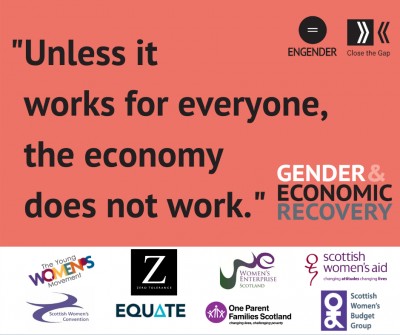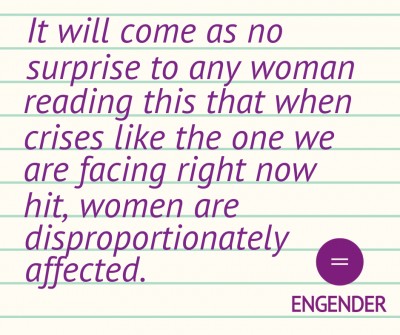Engender blog
Scotland’s economic recovery will fail if it doesn’t think about women’s equality

Leading women’s organisations have today called for a radical rethink of how Scotland’s economy can recover from the downturn caused by Covid-19. Nine principles for economic recovery, produced by Engender and Close the Gap and endorsed by national women’s and parenting organisations, call for a shift in the way that Scotland’s pursues inclusive growth. Ranging from investment in social care as infrastructure to the use of gendered economic indicators in place of GDP, the paper argues that unless it works for everyone, the economy does not work.
They also highlight that many of the frontline jobs which are now seen as vital, and which also bear the greatest infection risk, are dominated by Black and minority ethnic women. Disabled women are also shown to be particularly at risk from an ungendered economic recovery, bearing the brunt of a decade of austerity and social care cuts. The organisations are calling for participatory economic decision-making which benefits all women.
Engender’s Executive Director Emma Ritch said:
“As Scotland enters Phase 1 of lockdown measures easing, economic recovery is a long way off. But in order for that recovery to work for women as well as men, we can’t rely on the traditional stimulus measures that create ‘jobs for the boys’. Covid-19 has been a wake-up call for many about how much we separate the unpaid care our society relies on from our understanding of what the economy is. In fact, care is an economic issue.
“The recovery gives us an opportunity to think about what truly matters to people – wellbeing, community, and solidarity. We need to create the demand for goods and services that will sustain our local economies by investing in public services and putting money directly in women’s pockets. Decision-makers must recognise that the economy and women’s equality go hand in hand.”
Anna Ritchie Allan, Executive Director of Close the Gap said:
“Women’s work is systematically undervalued in the economy, including work that is critical to the Covid-19 response such as health and social care, retail and cleaning. Public investment is central to increasing pay in these sectors. 50 years on from the Equal Pay Act, pay equality remains elusive for many women. Scotland has a plan to close the gender pay gap, but we need bold action on what Covid-19 has exposed, that women’s work is undervalued, underprotected, and underpaid.
“Scottish Government is committed to inclusive economic growth, but there’s a lack of detail about what that means for women. These principles provide a foundation for a model of inclusive growth which will ensure women aren’t left behind.”
Data matters in our response to Covid-19
As Engender continues to work to ensure that women's equality is at the heart of Scotland's response to Covid-19, our Executive Director, Emma Ritch, writes about why gathering the right data is so important.
-400.png) One
of the ways in which we are trying to understand Covid-19, and respond
to the devastation it has brought to families and communities, is
through numbers. The number of tests administered to populations, the
numbers of people admitted to hospital, and the numbers of deaths
attributable to Covid-19 are reported on rolling news. Readers check the
charts produced by data journalists for signs that incidence of the
virus has peaked. Numbers are studded through reporting on possible
strategies for loosening lockdown while constraining transmission of the
virus.
One
of the ways in which we are trying to understand Covid-19, and respond
to the devastation it has brought to families and communities, is
through numbers. The number of tests administered to populations, the
numbers of people admitted to hospital, and the numbers of deaths
attributable to Covid-19 are reported on rolling news. Readers check the
charts produced by data journalists for signs that incidence of the
virus has peaked. Numbers are studded through reporting on possible
strategies for loosening lockdown while constraining transmission of the
virus.
Covid-19 and women's equality - rolling blog
 With the situation around Covid-19 changing every day, one certainty is that it will have an immediate, long-lasting, and disproportionate impact on women. This rolling blog will be kept updated with our work to keep women's equality at the heart of policy-making during the pandemic.
With the situation around Covid-19 changing every day, one certainty is that it will have an immediate, long-lasting, and disproportionate impact on women. This rolling blog will be kept updated with our work to keep women's equality at the heart of policy-making during the pandemic.
We’ve also created a page on our website which has support numbers, resources, and all of the great writing about women and Covid-19 we’re finding. You can access it here.
-----
COVID-19: why women’s equality must be at the heart of our response

This blog from our Communications and Engagement Manager, Alys Mumford, sets out why we've released a paper on women and COVID-19, and why we must never stop talking about women's equality.
The world is a new and confusing place for many of us. A rollercoaster of changes to work, school and care schedules, getting to grips with online meetings and digital lessons, fear for our friends, families and neighbours.
It will come as no surprise to any woman reading this that when crises like the one we are facing right now hit, women are disproportionately affected. More likely to be in precarious and low-paid work, more likely to shoulder additional caring responsibilities, and more likely to be the one worrying about food shopping, dentist trips, and prescriptions.
Downloads
 Engender Briefing: Pension Credit Entitlement Changes
From 15 May 2019, new changes will be introduced which will require couples where one partner has reached state pension age and one has not (‘mixed age couples’) to claim universal credit (UC) instead of Pension Credit.
Engender Briefing: Pension Credit Entitlement Changes
From 15 May 2019, new changes will be introduced which will require couples where one partner has reached state pension age and one has not (‘mixed age couples’) to claim universal credit (UC) instead of Pension Credit.
 Engender Parliamentary Briefing: Condemnation of Misogyny, Racism, Harassment and Sexism
Engender welcomes this Scottish Parliament Debate on Condemnation of Misogyny, Racism, Harassment and Sexism and the opportunity to raise awareness of the ways in which women in Scotland’s inequality contributes to gender-based violence.
Engender Parliamentary Briefing: Condemnation of Misogyny, Racism, Harassment and Sexism
Engender welcomes this Scottish Parliament Debate on Condemnation of Misogyny, Racism, Harassment and Sexism and the opportunity to raise awareness of the ways in which women in Scotland’s inequality contributes to gender-based violence.
 Gender Matters in Social Security: Individual Payments of Universal Credit
A paper calling on the Scottish Government to automatically split payments of Universal Credit between couples, once this power is devolved to the Scottish Parliament.
Gender Matters in Social Security: Individual Payments of Universal Credit
A paper calling on the Scottish Government to automatically split payments of Universal Credit between couples, once this power is devolved to the Scottish Parliament.
 Gender Matters Manifesto: Twenty for 2016
This manifesto sets out measures that, with political will, can be taken over the next parliamentary term in pursuit of these goals.
Gender Matters Manifesto: Twenty for 2016
This manifesto sets out measures that, with political will, can be taken over the next parliamentary term in pursuit of these goals.
 Scottish NGO Briefing for UN Special Rapporteur on Violence Against Women
Joint briefing paper for the UN Rapporteur on Violence Against Women.
Scottish NGO Briefing for UN Special Rapporteur on Violence Against Women
Joint briefing paper for the UN Rapporteur on Violence Against Women.

Newsletter
Sign up to receive our newsletter here:
Sign up to our mailing list
Receive key feminist updates direct to your inbox: